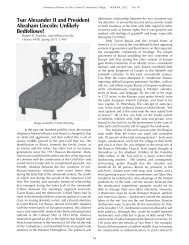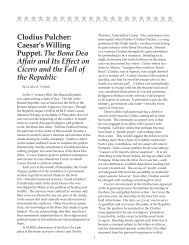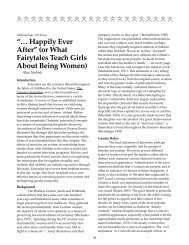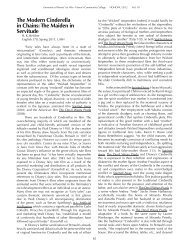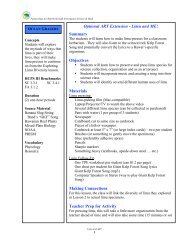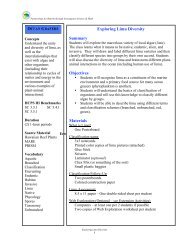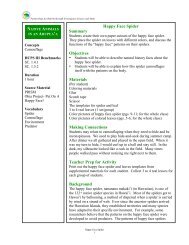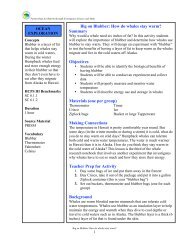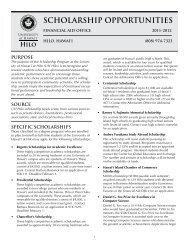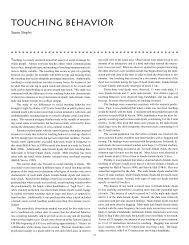A JOURNAL OF ACADEMIC WRITING VOLUME 8
A JOURNAL OF ACADEMIC WRITING VOLUME 8
A JOURNAL OF ACADEMIC WRITING VOLUME 8
Create successful ePaper yourself
Turn your PDF publications into a flip-book with our unique Google optimized e-Paper software.
the country’s economy disproportionately (p. 43). In the same<br />
year, 70% of Indonesian private businesses were controlled by<br />
the Chinese (Chua, 2003, p. 43)<br />
The continued growth of economic control did not come<br />
with the full participation of Chinese in Indonesian social and<br />
political life. Yau (2008) considered this situation as a paradox,<br />
where the Chinese were granted privileges to operate their<br />
business, but were halted in their access to social and political<br />
participation (para.11). The Chinese economic dominance was<br />
largely seen as a national problem (Yau, 2008, para. 11). Yau<br />
(2008) blames the Dutch for generating the seeds of hatred<br />
and stereotypes among Indonesians based on race (Para.9). The<br />
Dutch provided certain privileges to the Chinese by granting<br />
them control over some profitable businesses, but at the<br />
same time restricted them from interacting with the natives,<br />
specifically by limiting their movements out of urban ghettos<br />
(Yau, 2008, para. 9).<br />
However, there was a time when ethnic Chinese in<br />
Indonesia did enjoy relatively less discriminative policies.<br />
This was during the early period of Indonesian independence,<br />
though they were still considered non-indigenous. Under<br />
the presidency of Sukarno and the parliamentary democracy<br />
system (1949-1958), the Chinese were allowed to establish<br />
organizations that could participate in cultural, social and<br />
political activities and even schools where instruction were<br />
given in Chinese (Suryadinata, 2001, p.504). A well known<br />
ethnic Chinese institution focusing in sociopolitical matter<br />
was established following the merging of several small<br />
Chinese organizations. The organization, known as Badan<br />
Permusyawaratan Kewarganegaraan Indonesia (BAPERKI) or<br />
Indonesian citizenship consultative body, set its goal based on<br />
the idea of promoting equality among the citizens, regardless<br />
of ethnic origin, and they specifically fought for the Chinese<br />
minority’s cultural rights (Suryadinata, 2001, p.504).<br />
The relatively free environment for the ethnic Chinese as<br />
a distinguished minority group ended as new political power<br />
emerged. Suryadinata (2001) posited that the downfall of<br />
President Sukarno after a failed alleged coup by Partai Komunis<br />
Indonesia (PKI), or Indonesian Communist Party, led to the<br />
closure of BAPERKI, which had been in support of both PKI<br />
and the President (p.505). Lieutenant-General Suharto, who led<br />
the army operation to hunt down the members of PKI and its<br />
affiliates due to their role in the alleged coup, soon became the<br />
next President with the support from the right wing group in<br />
the military (Suryadinata, 2001, p.505). Besides the millions<br />
of alleged communist supporters that died, tens of thousands<br />
of Chinese were also killed during the hunt-down operation<br />
(Johnston, 2005, para. 9).<br />
The allegiance of a well-known Chinese organization to<br />
the former regime and the Communist Party created a distance<br />
62 - HOHONU Volume 8 2010<br />
between the new government and ethnic Chinese. Fuelled by<br />
the accusation of being supportive to the Communists, the<br />
Chinese faced harshly discriminative policies during President<br />
Suharto’s rule. During the period known as New Order<br />
(1966-1998), the ethnic Chinese were literally categorized as<br />
non-pribumi, separating them from the native pribumi (Yau,<br />
2008, para.10). As non-pribumi, the Chinese were subject to<br />
assimilation measures, which included giving up their ethnic<br />
identity, enrolling in Indonesian schools, and changing their<br />
names (Yau, 2008, para.11). Groups and institutions affiliated<br />
with Chinese were suppressed if not banned, including Chinese<br />
languages, culture, and religion (Yau, 2008, para.12). Although<br />
some top Chinese became friends of Suharto and subsequently<br />
became the richest men in Southeast Asia, the New Order<br />
regime in fact was a tragedy for the relatively large number of<br />
ordinary Chinese (Johnston, 2005, para. 13-14).<br />
In spite of the harsh assimilation efforts, the Chinese<br />
are still seen as “aliens” to the indigenous Indonesians. The<br />
failure of the efforts exploded in a large-scale anti-Chinese<br />
riot in 1998. President Suharto’s resignation in May, 1998,<br />
was accompanied by anti Chinese violence where for more<br />
than three days of violence, the rioters looted Chinese shops<br />
and gang raped more than 150 Chinese women (Chua, 2003,<br />
p.44-45). Chua (2003) reported that not only were thousands<br />
of people dead, but the mayhem also resulted in $40 to $60<br />
billions of capital confiscation, most of which was controlled<br />
by Chinese, causing a huge economic crisis from which the<br />
country is still struggling to recover (Chua, p.45).<br />
Since the Reformation Era, starting with the downfall of<br />
Suharto in 1998, the Indonesian government has taken several<br />
significant measures to address the issue of ethnic Chinese.<br />
Chinese Indonesians can now celebrate the Chinese New Year<br />
and use their Chinese name and symbols (Johnston, 2005,<br />
para.26). Since then, they are actively involved in political<br />
activities (Suryadinata. 2001, p.509-510). In terms of the civil<br />
society participation, ethnic Chinese communities are able<br />
to express themselves publically (Suryadinata, 2001, p. 522).<br />
Moreover, Confucianism was recognized as one of the official<br />
beliefs in Indonesia along with the other five major religions.<br />
Meanwhile, some Chinese Totok are able to reestablish their<br />
clan relationships (Suryadinata, 2001, p. 522). In another<br />
example, Suryadinata (2001) reported that the former President<br />
Abdurahman Wahid, a.k.a Gus Dur, was invited to deliver a<br />
speech during the opening of Indonesian Hakka association in<br />
Jakarta, in 2000, where the former president praised the ethnic<br />
Chinese, and pledged their support to continue to invest and<br />
help in the Indonesian economic recovery effort. It was during<br />
the presidency of Gus Dur that many of the discriminatory laws<br />
against the ethnic Chinese were revoked (Suryadinata, 2001, p.<br />
521). The president also appointed a nationalist ethnic Chinese,



